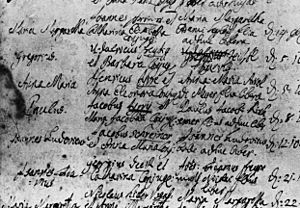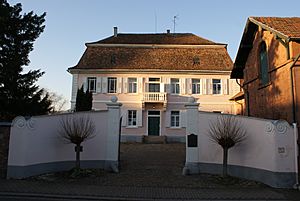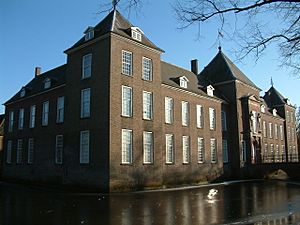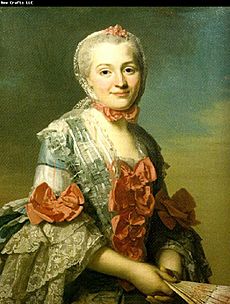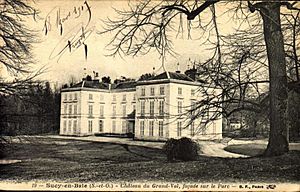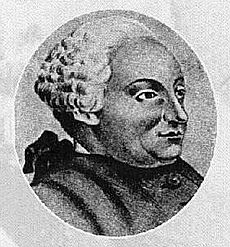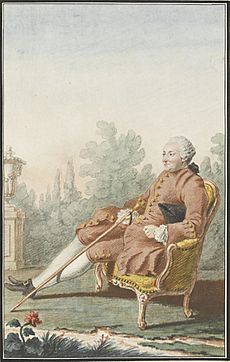Baron d'Holbach facts for kids
Quick facts for kids
Paul-Henri Thiry, Baron d'Holbach
|
|
|---|---|
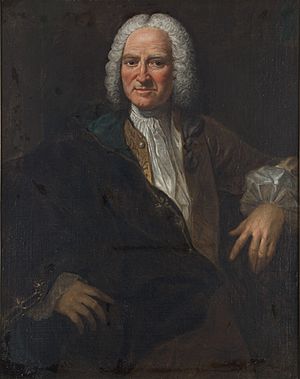
Portrait by Alexander Roslin
|
|
| Born |
Paul Heinrich Dietrich
8 December 1723 |
| Died | 21 January 1789 (aged 65) |
| Era | 18th-century philosophy |
| Region | Western philosophy |
| School | French materialism |
|
Main interests
|
Atheism, Determinism, Materialism |
|
Influences
|
|
Paul-Henri Thiry, Baron d'Holbach (8 December 1723 – 21 January 1789) was an important thinker during the Age of Enlightenment. He was a French-German philosopher, writer, and a key contributor to the Encyclopédie.
Born Paul Heinrich Dietrich in Edesheim, Germany, he spent most of his life in Paris, France. There, he hosted a famous salon where many smart people met. D'Holbach was known for sharing "Protestant and especially German thought," especially in science. However, he is most famous for his strong views against religion, known as atheism. His most well-known books are The System of Nature (1770) and The Universal Morality (1776).
Contents
About Paul-Henri Thiry d'Holbach
Paul-Henri Thiry d'Holbach was born on December 8, 1723, and passed away on January 21, 1789. He didn't write much about his early life. We know he was raised in Paris by his uncle, Franz Adam Holbach. His uncle was very rich from investing in the stock market.
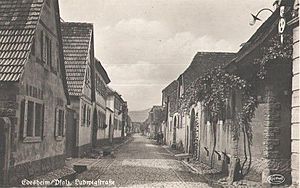
Thanks to his uncle's money, d'Holbach studied at Leiden University from 1744 to 1748. There, he became good friends with John Wilkes. In 1750, he married his cousin, Basile-Geneviève d'Aine. They had a son named Francois Nicholas.
In 1753, both his uncle and father died. D'Holbach inherited a huge fortune, including Heeze Castle in the Netherlands. He remained wealthy throughout his life. After his first wife died in 1754, he married her sister, Charlotte-Suzanne d'Aine, the next year. They had a son, Charles-Marius, and two daughters, Amélie-Suzanne and Louise-Pauline.
During hot Paris summers, d'Holbach would go to his country home, Le Château de Grand-Val, near Sucy-en-Brie. He often invited friends to stay, including Denis Diderot. D'Holbach was known for being very generous. He often helped his friends financially without anyone knowing. Some people think the good atheist character Wolmar in Jean-Jacques Rousseau's book Julie, ou la nouvelle Héloïse was based on d'Holbach.
D'Holbach died in Paris on January 21, 1789, just before the French Revolution. His anti-religious books were published secretly. People didn't widely know he wrote them until the early 1800s. He was buried in the Church of Saint-Roch, Paris, but the exact spot of his grave is unknown.
D'Holbach's Famous Salon
From about 1750 to 1790, Baron d'Holbach used his wealth to host one of the most famous and fancy Parisian salons. This gathering place quickly became very important for the people who wrote for the Encyclopédie.
Meetings happened twice a week, on Sundays and Thursdays, at d'Holbach's home in Paris. Only men were allowed to attend. The discussions were very intellectual and covered many deep topics. This, along with excellent food, expensive wine, and a library of over 3000 books, attracted many important visitors.
Regular guests at his salon, called the coterie holbachique, included:
- Denis Diderot
- Grimm
- Condillac
- Condorcet
- D'Alembert
- Marmontel
- Turgot
- Raynal
- Helvétius
- Morellet
- Naigeon
- And for a while, Jean-Jacques Rousseau.
Famous international thinkers also visited, such as:
There's a story that David Hume once doubted if atheists truly existed. D'Holbach then told him that he was sitting at a table with seventeen atheists!
D'Holbach's Writings
D'Holbach wrote many books and articles. He is best known for his philosophical works, which were often published secretly.
Helping with the Encyclopédie
D'Holbach wrote and translated many articles for the Encyclopédie. This huge project aimed to collect all human knowledge. As a German who became a French citizen, he translated many German science books into French. Between 1751 and 1765, d'Holbach wrote about 400 articles. Most were about science. He also helped edit several volumes on natural philosophy (science). He might have also written some critical entries about non-Christian religions, which were secretly criticisms of Christianity.
Books Against Religion
D'Holbach is most famous for his philosophical books. All of them were published without his name or using fake names. They were printed outside France, usually in Amsterdam. His philosophy was very clear: he believed only in matter and no God. This is called French materialism.
In 1761, his book Christianisme dévoilé (Christianity Unveiled) came out. In it, he attacked Christianity and religion in general. He believed religion stopped people from improving society. Even Voltaire, who believed in God but not organized religion, disliked d'Holbach's views. Voltaire said the book "leads to an atheistic philosophy that I detest." Other similar books followed, like La Contagion sacrée and Théologie portative. Jacques-André Naigeon helped d'Holbach with these books.
The System of Nature
In 1770, d'Holbach published his most famous book, The System of Nature (Le Système de la nature). He used the name of a dead person, Jean-Baptiste de Mirabaud, to hide his identity. In this book, he said there is no God. He believed the universe is just matter moving according to natural laws. He wrote, "There is no necessity to have recourse to supernatural powers to account for the formation of things." This means he thought everything could be explained by nature, without needing a God.
The System of Nature is a long book that describes a world without supernatural forces. Some experts think Denis Diderot might have helped write parts of it. This book is seen as the peak of French materialism and atheism.
D'Holbach's main reason for challenging religion was moral. He thought Christian institutions were a big problem for making society better. For him, being good didn't come from religious texts or the Church. It came from seeking happiness. He believed people are driven by what's best for them, which he called "enlightened self-interest." He thought true happiness comes from being virtuous.
This book was very radical. Many people, both religious leaders and other philosophers, found it very upsetting. The Catholic Church in France even threatened the king to stop the book from spreading. Many people wrote responses to it. The Catholic theologian Nicolas-Sylvestre Bergier wrote Examen du matérialisme (Materialism Examined). Voltaire also wrote against it in his Dictionnaire philosophique. Even Frederick the Great, a king, wrote a response.
Politics and Morals
In his later works, d'Holbach focused more on moral and political ideas. In books like Système social (1773) and Morale universelle (1776), he tried to create a system of morals to replace the Christian one he had attacked. However, these books were not as popular as his earlier ones.
D'Holbach criticized how power was misused in France and other places. But he didn't support revolution or mob rule. Instead, he wanted educated people to fix the government's problems. His political ideas were influenced by the British thinker Thomas Hobbes. D'Holbach even translated Hobbes's work De Homine (Of Man) into French.
Economic Ideas
D'Holbach also shared his thoughts on economics in his books. Like John Locke, he believed in private property. He said that wealth comes from work, and everyone should have the right to what they earn.
However, d'Holbach also thought the government should stop a few people from getting too much wealth. He believed that inherited titles (like dukes or barons) should be removed because they made people lazy. He also criticized the French government's system of letting private people collect taxes. He said these tax collectors often took too much money from citizens. He also thought religious groups should be voluntary and not get government money. D'Holbach was also a strong critic of luxury in his time.
Death and Burial
D'Holbach died shortly before the French Revolution. He was buried on January 21, 1789, in the Church of Saint-Roch, Paris. His grave was located under the altar. This burial place was disturbed twice: once during the French Revolution and again during the 1871 Paris Commune.
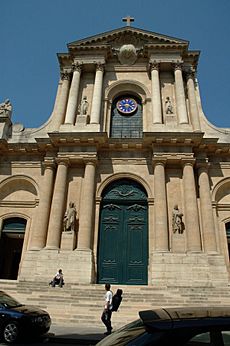
D'Holbach and Other Thinkers
D'Holbach and Diderot
It's not clear when d'Holbach and Denis Diderot first met, but they knew each other by 1752. This was when the second volume of the Encyclopédie, with d'Holbach's articles, came out. They agreed on many ideas about religion and philosophy. They also enjoyed similar hobbies, like eating good food, walking in the countryside, and collecting art.
When d'Holbach's very strong anti-religious book, The System of Nature, was published, many people thought Diderot had written it. However, based on the writing style, it seems Diderot didn't write the whole book, though he might have written some parts.
D'Holbach and Rousseau
Jean-Jacques Rousseau was also a guest at d'Holbach's dinners. Rousseau stopped coming to the salon for a while after an event in February 1754. Diderot had arranged for someone to read a play at d'Holbach's house. The play was so strange that the guests couldn't help but be amused. But then, the guests, including Diderot and others, praised the play highly, which made the writer happy.
Later in 1754, when Rousseau learned that d'Holbach's wife had died, he sent a kind letter. Their friendship started again. For three more years, Rousseau visited d'Holbach's salon.
Later, d'Holbach, along with Grimm and Diderot, secretly arranged for Rousseau's wife, Thérèse Levasseur, and her mother to receive money regularly. They asked them not to tell Rousseau, fearing it would hurt his pride. When Rousseau eventually found out, he was very angry with his friends for embarrassing him.
D'Holbach's Impact and Legacy
According to Marmontel, d'Holbach "had read everything and never forgotten anything of interest." Jean-Jacques Rousseau said that d'Holbach was very learned and knowledgeable. Denis Diderot strongly supported d'Holbach's book System of Nature.
D'Holbach's ideas influenced many important figures, including:
Some historians believe d'Holbach, more than Voltaire or Diderot, was the main source of anti-religious ideas in the late 1700s and early 1800s. During the French Directory (a government after the French Revolution), one of d'Holbach's books was sent to all government leaders to help control religious revivals.
In England, d'Holbach's views influenced Priestley, Godwin, and Shelley. In Germany, his ideas influenced Immanuel Kant. It is also thought that d'Holbach's views might have influenced the historical materialism of Karl Marx.
An Asteroid named (6956) Holbach is named in his honor.
See also
 In Spanish: Paul Henri Thiry d'Holbach para niños
In Spanish: Paul Henri Thiry d'Holbach para niños
- Ibn al-Rawandi
- Lists of atheists
Images for kids
 | William L. Dawson |
 | W. E. B. Du Bois |
 | Harry Belafonte |


